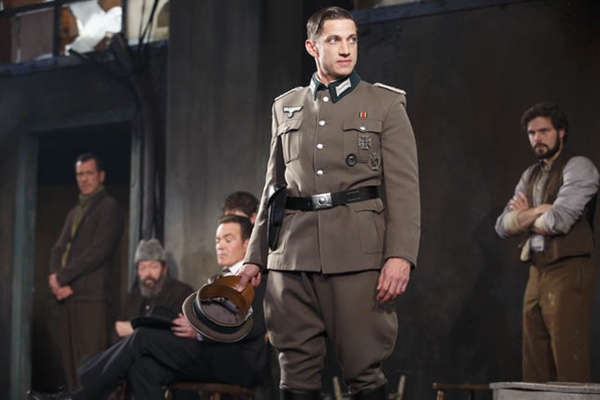The Nazis at Vichy, France, in World War II: The Arthur Miller Play

James Carpinello and the cast of Incident at Vichy. Image: Photo by Joan Marcus.
When Arthur Miller’s play Incident at Vichy begins, a group of men rounded up by the Nazis are staring at the audience. Slowly, ever so slowly, they begin to talk about how they were hauled into a warehouse of some kind and what they think is going to happen to them. The play crawls along for about 45 minutes, with little character development and not much plot, until someone says the men might be thrown into the “furnace.”
It is like an electric charger. Suddenly, the play jumps. It reels; it soars.
Incident at Vichy, written in 1964 and set in 1942 when concentration camps and the murder of the Jews was not yet a well-known fact, opened last week at the Pershing Square Signature Center, on West 42 Street, New York. It is another World War II play and another Holocaust story and a good one.
The power of the play is to get the audience interested in each of the eight prisoners and listen to their stories. They are different, from different backgrounds and different economic circumstances. They think they are there to have their papers checked, but as time drags by the reason becomes, they believe, more sinister. At the end of each man’s interview with Nazi officers there is a ‘pop’ and flash that indicates their picture is being taken. Why? Why do some emerge and others disappear? There is a “good” colonel that one of the prisoners knows as a customer in his restaurant. Will that get him off the hook? Another man is just an actor. Surely, he will be let go, won’t he? And, of course, there is the mysterious Von Berg.
During the second half of the play the German officers become steelier, and downright hateful. One of them, a major, seems to have been dragooned into the interrogation against his will, but does not dare say he is opposed to it. What are the Nazis trying to discover? Why these eight men? Do they think they are Jews (one explains in great detail how his abductors measured his nose). What does this portend for all of France?
On the negative side of the fifty year old play, that has a lot of cobwebs, playwright Miller takes far too long to bring the hunt for Jews all over France, and Europe, into the drama. That is the soul of the play and it should be discussed much earlier. We are also uncertain who these men are and why they were picked up. It is hinted that they are all Jews and that they all have false official papers. Do they? What about Von Berg, played wonderfully by Richard Thomas. He is an Austrian Prince, a Catholic and a noble whom everybody in the warehouse seems to have heard about. Why on earth was he picked up? And what is the goal of the interrogations? Are they in fact going to be sent to concentration camps? If so, why were their families not picked up?
Director Michael Wilson keeps you in the dark, nicely, throughout the story, even though you suspect the men are Jews, and that adds to the tension.
The weakness of this generally good play is that you learn very little history. The title of the play says it is a story about the French Vichy government in World War II, but that is explained in just a few seconds and people who see the play will not have much understanding of what Vichy was, how the Germans separated France into two countries within one large nation, and the very tricky relationship between French authorities and their Nazi occupiers.
After the Nazis conquered France in 1940, they ran the country but allowed the French to control the southern half of the country, but in name only. The capital was at Vichy. The French puppet government there and its officials did what the Nazis ordered. This government survived until nearly the end of the war. In 1942, the land controlled by Vichy officials was occupied by the German army as was the northern half of the country. The press was strictly monitored, women’s rights diminished and regular hunts for the Jews conducted. All of this information could have been put in the play in a few lines, but was not. It is a loss.
Director Wilson does a fine job of bringing the aging play to life and milking the drama out of it, particularly in the second half. He gets fine performances from Thomas as Von Berg, Jonny Orsini as Lebeau, Alex Morf as Bayard, John Procaccino as Marchand, Derek Smith as Monceau, David Abeles as the waiter, Jonathan Gordon as the hyperactive teenager, Darren Pettie as Leduc and James Carpinello as the Major.
Incident at Vichy is, for the most part, an entertaining and at times frightening play that should be seen.
PRODUCTION: The play is produced by the Signature Theater. Scenic Design: Jeff Cowie, Costumes: David C. Woolard, Lighting: David Lander, Sound: Joh Gromada, The play runs through December 20.